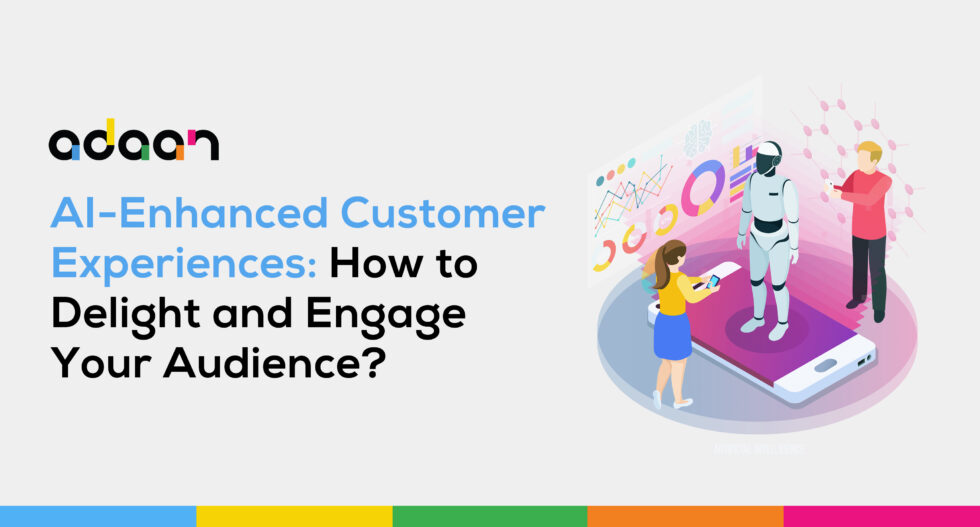Unlocking the Power of AI for Exceptional Customer Experiences
Have you ever thought about how companies manage to provide personalized experiences, offer customer support around the clock, and even predict your needs and desires? It’s quite remarkable, isn’t it? Well, the secret behind their success lies in the incredible power of Artificial Intelligence (AI).
In this fast-paced world of ever-evolving technology, AI has emerged as a game-changer for businesses striving to meet and surpass customer expectations. It has opened up a whole new realm of possibilities and completely revolutionized how companies interact with their customers.
So, in this blog post, let’s take a deep dive into the fascinating ways AI can transform customer engagement, digital marketing, and help businesses survive and thrive in today’s highly competitive landscape. From automating customer service to providing tailored recommendations, AI has the immense potential to elevate customer experiences.
Together, we’ll uncover the transformative magic of AI and explore how it can unlock truly exceptional customer journeys. Are you ready? Let’s dive in!
The Changing Landscape of Customer Expectations
Our ever-changing digital world has resulted in significant changes in customer expectations over time. Advanced technology trends such as personalization or automation drive these evolving requirements. An individualized experience is a must-have nowadays; customers demand effortless trips through every phase- exploring your site, chatting with a bot or receiving trustworthy recommendations.
For companies competing in this dynamic landscape, surpassing these standards is no longer an option but a prerequisite for success and stability within their market sector.
Artificial Intelligence (AI) and its transformative abilities have played a crucial role in effectively revolutionizing how businesses engage with modern-day customers. Companies now have access to valuable insights based on analyzing vast amounts of consumer data through AI algorithms and machine learning capabilities resulting in delivering personalized experiences at scale.
Whether it’s through leveraging chatbots that offer instant support or deploying intelligent recommendation systems with bespoke product or service suggestions, AI has become critical for creating exceptional customer journeys. This raises a pertinent question – why is AI becoming more vital to ensuring high levels of customer satisfaction?
The answer lies deeply rooted in its unique strength in quickly processing massive amounts of data while enabling organizations to gain deeper insights into consumers’ preferences, behaviour patterns and needs through analytics-powered machine learning algorithms. Enterprises can now leverage this information to proactively address potential issues while delivering timely solutions that exceed clients’ expectations.
This results in higher levels of satisfied consumers who ultimately stay loyal over time, instilling trust within their chosen brands/businesses and efficiently achieving their goals.
Moreover, AI enables businesses to automate repetitive tasks, freeing human resources to focus on all the more complex and value-added activities. By automating customer service processes, AI-powered chatbots can handle routine inquiries, provide instant responses, and even escalate complex issues to human agents when necessary.
This enhances efficiency and ensures round-the-clock availability, enabling businesses to deliver seamless customer support irrespective of time zones or operational hours.
Personalization at Scale: Tailoring Experiences to Individual Preferences
One of the most significant ways AI can enhance customer engagement is through personalization at scale. By leveraging AI-powered algorithms and techniques, companies can analyze huge amounts of customer data to gain valuable insights into individual preferences, behaviour patterns, and purchase history. This data forms the foundation for descriptive, diagnostic, predictive, and prescriptive analytics.
Descriptive analytics helps businesses understand past customer interactions and behaviours. Descriptive analytics also provides crucial information about what has happened and allows companies to identify trends and patterns.
Diagnostic analytics takes things further by uncovering the reasons behind certain outcomes or events. Businesses can make informed decisions to optimize the customer experience by understanding why something occurred. That’s the power of diagnostic analytics!
Predictive analytics is where AI truly shines. By analyzing historical data, AI algorithms can accurately predict future customer behaviour. This empowers companies to anticipate customer needs and desires, enabling proactive engagement and personalized recommendations.
Furthermore, prescriptive analytics furthers predictive analysis by providing actionable insights and recommendations on optimizing customer experiences. This is powered by data analytics techniques such as data cleaning, sorting, prepping and comparing.
Chatbots and Virtual Assistants: 24/7 Support and Instantaneous Engagement
In the realm of customer service, AI has brought forth significant advancements through chatbots and virtual assistants. Traditional customer support methods often involved long wait times and limited availability. However, with AI-powered chatbots, companies can provide real-time support and instantaneous engagement 24 hours a day, seven days a week.
Chatbots can handle simple or repetitive customer queries, freeing up human customer support agents to focus on more complex issues. This enables companies to create an omnipresent customer service desk, ensuring that customers receive prompt assistance whenever needed.
Moreover, chatbots are equipped with Natural Language Processing (NLP) capabilities and can engage in human-like conversations, understanding customer intents and responding conversationally. This level of personalization and responsiveness creates a positive customer experience and builds trust.
Predictive Analytics: Anticipating Customer Needs and Desires
Imagine a scenario where companies can accurately anticipate your needs and desires even before you express them. This is exactly where the power of predictive analytics comes into play. By analyzing customer data, AI algorithms can identify patterns and trends, allowing companies to make accurate predictions about future customer behaviour.
Predictive analytics enables businesses to offer personalized recommendations, targeted offers, and tailored marketing campaigns. For example, e-commerce platforms use AI algorithms to analyze customers’ purchase histories, search queries, and browsing patterns.
The “similar products you’ve purchased” or “recommended for you” sections on these platforms are all driven by AI. This level of personalization enhances the customer experience, boosts engagement, and drives sales.
Natural Language Processing: Enabling Human-like Conversations
When it comes to engaging customers effectively, communication plays a pivotal role. And this is where Natural Language Processing (NLP), a branch of AI, comes into play. NLP focuses on the art of understanding and interpreting human language, enabling AI-powered systems to engage in conversations just like humans do.
This remarkable technology allows businesses to comprehend customer intents, provide meaningful responses, and create truly engaging interactions.
Thanks to NLP, chatbots and virtual assistants can now communicate with customers naturally and fluidly. They can address queries, offer assistance, and provide relevant information, all while maintaining a conversational tone. This means customers no longer have to adapt to rigid interfaces or navigate complicated menus.
Instead, they can engage with brands more intuitively and human-likely. Moreover, the power of NLP lies in its ability to offer personalized and contextually relevant interactions, elevating the customer experience to a whole new level of seamlessness.
Imagine chatting with a virtual assistant who understands your questions, interprets your intentions, and responds in a way that feels like talking to a knowledgeable human agent. NLP makes this possible by analyzing the context, syntax, and sentiment of the customer’s message, allowing the AI system to generate accurate and helpful responses.
Sentiment Analysis: Understanding and Responding to Customer Emotions
Customers’ emotions significantly impact how they perceive and interact with a brand. Businesses must grasp customer sentiment and emotions as they can greatly influence their overall experience. When companies have a deeper understanding of these emotions, they can pinpoint areas that require improvement, address concerns promptly, and ultimately enhance customer satisfaction.
One effective approach to gaining insights into customer sentiment is through AI-powered sentiment analysis. This technology uses effective data cleaning, natural language processing, and machine learning techniques to analyze various customer feedback forms, including social media posts and other textual data.
It goes beyond simply collecting data and delves into the underlying emotions expressed by customers. This valuable information enables businesses to assess levels of customer satisfaction, detect potential issues, and proactively take measures to resolve them.
Businesses can forge stronger connections with their customer base by empathetically acknowledging and responding to customer emotions. This genuine concern and understanding can contribute to developing trust and loyalty towards the brand. When customers feel heard and understood, they are more likely to remain loyal and advocate for the brand to others. Therefore, businesses must prioritize and embrace customer emotions to build lasting relationships and establish a strong brand presence.
Visual Recognition: Enhancing Product Discovery and Engagement
AI-powered visual recognition has transformed how customers explore and interact with products. With the help of image recognition and computer vision technologies, businesses have unlocked new possibilities to elevate their customers’ experience.
One of the remarkable benefits of visual recognition is its impact on product search capabilities. Customers can now simply use images to find the items they desire, eliminating the need for tedious textual descriptions. This streamlined approach saves time and effort, providing a more efficient and enjoyable shopping experience.
Additionally, the power of AI algorithms allows businesses to delve deeper into the visual aspects of products. These algorithms can extract valuable information such as colour, shape, and style preferences by analyzing images. This knowledge enables businesses to provide highly personalized and visually enticing product recommendations.
Customers are presented with options that align with their unique tastes and preferences, fostering a deeper connection and engagement with the brand. As a result, the likelihood of customers purchasing significantly increases.
Also, the immersive nature of visual recognition adds another layer of excitement to the shopping journey. Customers can visualize products more realistically and interactively, allowing them to make more informed decisions. Whether virtually trying on clothes or visualizing furniture in their living space, this immersive experience enhances customer satisfaction and confidence in their purchase decisions.
Ethical Considerations: Building Trust and Respecting Privacy
As we explore the world of AI-driven customer engagement, paying close attention to ethical considerations becomes crucial. Giving proper importance to safeguarding customer privacy, protecting their data, and maintaining transparency should be the top priorities when implementing AI. Companies are responsible for ensuring ethical standards are followed and regulatory guidelines are complied with when using AI-powered systems.
Respecting customer privacy involves being mindful of the information collected and its use and giving customers clear control over their data. Transparency plays a vital role in building trust. Companies should openly communicate about the use of AI, its capabilities, and how it may impact customer interactions. This transparency helps establish trust, empowering customers to make informed decisions and feel confident when engaging with the brand.
Data protection is another critical aspect of AI ethics. Businesses must prioritize the security and integrity of customer data, implementing robust measures to safeguard against unauthorized access or breaches. This protects customers’ personal information and demonstrates a commitment to responsible data handling.
Adhering to ethical standards and regulatory guidelines is essential from a legal standpoint and for maintaining customer trust. By aligning AI practices with these standards, businesses can ensure that customer rights are respected, their data is protected, and their experiences are positive.
As AI advances, businesses must remain vigilant in upholding ethical considerations. By doing so, companies can harness the power of AI while building strong and trusted relationships with their customers.
Conclusion
In conclusion, the power of AI in customer engagement cannot be overstated. From personalized experiences and 24/7 support to predictive analytics and natural language processing, AI empowers businesses to meet and exceed customer expectations in an increasingly digital world. Leveraging the capabilities of AI, companies can unlock new levels of customer engagement, drive brand loyalty, and elevate the overall customer experience.
By embracing AI and its various data analytics techniques, virtual assistants, chatbots, natural language processing, and visual recognition, businesses can confidently navigate the evolving customer landscape and create exceptional experiences that leave a lasting impression.
So, are you ready to harness the power of AI to revolutionize your customer engagement strategy? The possibilities are endless, and the time to act is now. Embracing AI will enhance your ability to connect with customers on a deeper level and give you a competitive edge in the market.
Stay ahead of the curve, adapt to your customer’s changing needs and preferences, and watch your business thrive in this era of AI-driven customer engagement!






